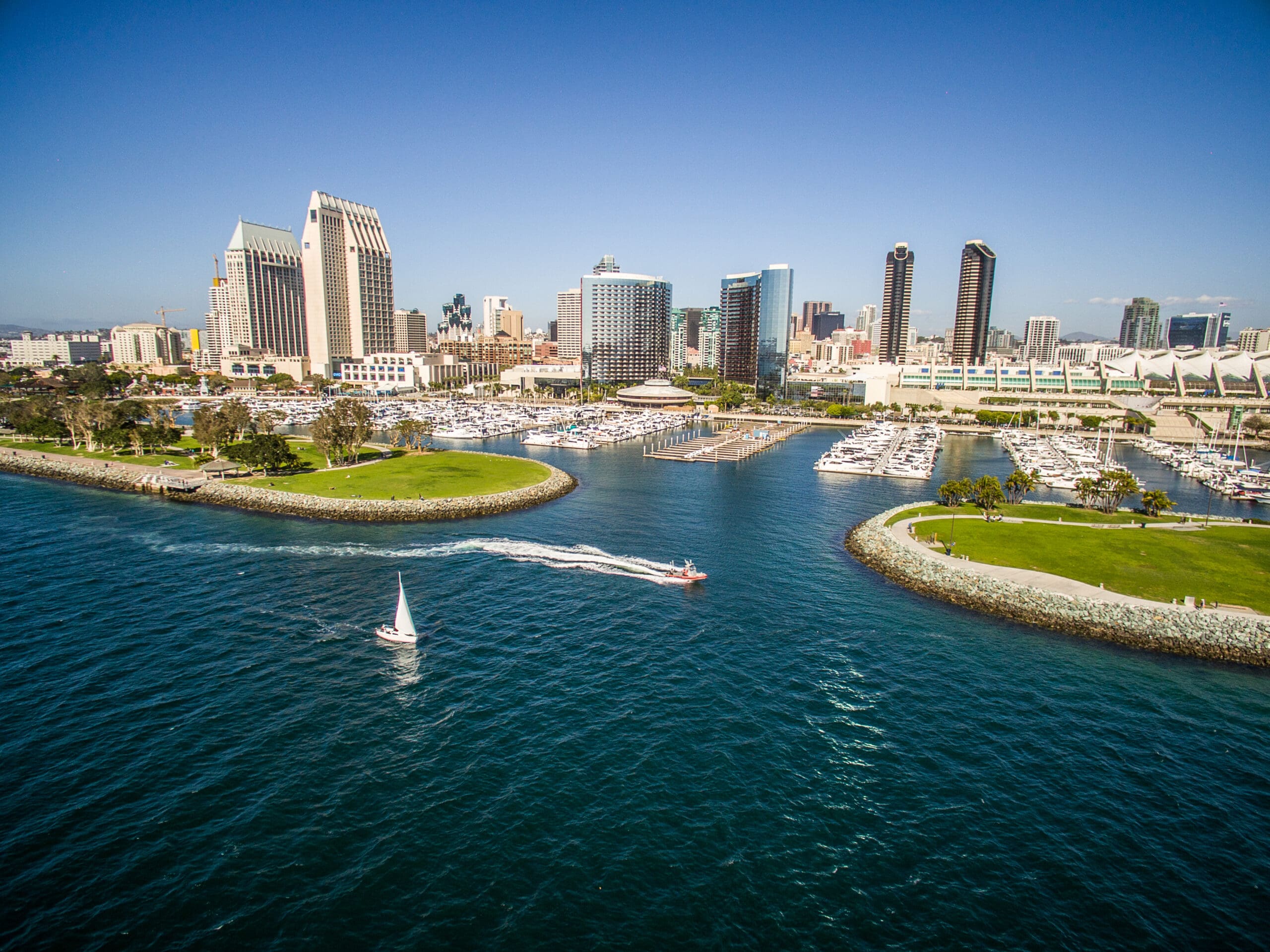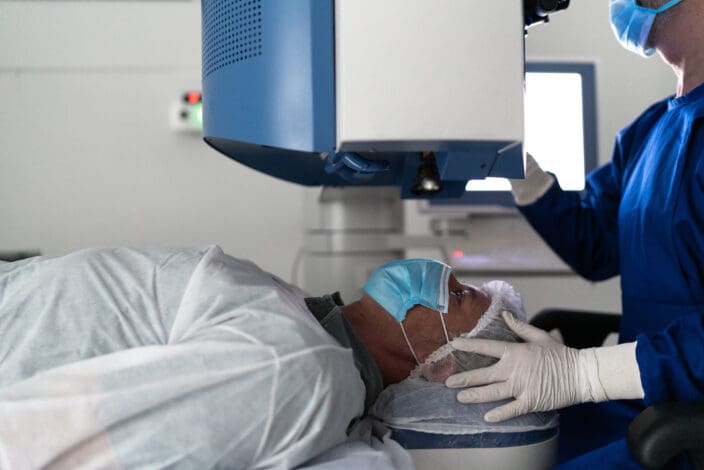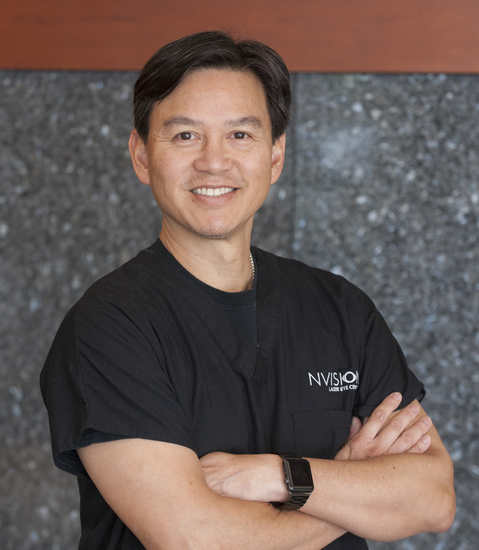
Locations › San Diego County › La Jolla
NVISION Eye Centers San Diego
Why Choose NVISION in La Jolla?
99% of NVISION patients see 20/20 or better
Our surgeons have performed over 2.5 million procedures
If a future enhancement is needed to maintain vision results, clinically qualified patients receive a same-technology enhancement procedure – free of charge.
We offer eight different vision correction surgeries including SMILE, PRK, EVO ICL, and more for those not suited for LASIK
LASIK San Diego | LASIK La Jolla
Looking for expert LASIK in San Diego or trusted vision correction in La Jolla? NVISION Eye Centers in La Jolla provides advanced laser vision correction and premium surgical options tailored to your unique eyes and lifestyle. Our board-certified ophthalmologists specialize in LASIK, EVO ICL, refractive lens exchange (RLE), and advanced cataract surgery, helping patients throughout San Diego achieve clearer, sharper vision with personalized care.
Recognized as a leading destination for LASIK in San Diego, our La Jolla center combines state-of-the-art laser technology with comprehensive diagnostic imaging to create customized treatment plans. Whether you’re researching the cost of LASIK in San Diego, exploring EVO ICL as an alternative to LASIK, or considering RLE or cataract surgery with premium intraocular lenses, our team will guide you through every option so you can make a confident, informed decision.
From your initial consultation through recovery, we focus on precision, safety, and long-term visual outcomes. Patients across La Jolla and the greater San Diego area choose NVISION for advanced vision correction delivered in a supportive, patient-first environment. If you’re ready to reduce dependence on glasses or contacts, our experienced team is here to help you see your best.
Vision Correction Procedures in La Jolla
Today's life-changing procedures make it possible to improve your vision to 20/20—or better.

LASIK Eye Surgery Lifetime Commitment

EVO ICL™ (Implantable Collamer Lens)

Cataract Surgery

Refractive Lens Exchange (RLE)
Other Procedures
Contoura® Vision LASIK
What is Contoura® Vision LASIK?
Contoura® Vision LASIK is an advanced form of LASIK eye surgery that utilizes topography-guided technology to tailor the laser treatment to the unique characteristics of an individual’s cornea. This technology aims to provide a more personalized and precise correction of refractive errors, including nearsightedness, farsightedness, and astigmatism. Contoura® Vision creates a highly precise and accurate map of a patient’s eyes measuring up to 22,000 unique elevation points on each eye.
Key features of Contoura® Vision LASIK include:
- Topography-Guided Treatment:
Contoura® Vision LASIK utilizes detailed corneal mapping or corneal topography to create a highly customized treatment plan. This map captures thousands of data points on the cornea, allowing for a more precise analysis of its shape and irregularities. - Personalized Correction:
The topography-guided technology enables the laser to precisely reshape the cornea based on the unique imperfections detected in the corneal map. This personalized approach aims to address higher-order aberrations, improving not only traditional refractive errors but also the overall quality of vision. - Reduced Glare and Halos:
Contoura® Vision LASIK is designed to reduce the occurrence of visual disturbances such as glare and halos, which can be associated with certain refractive errors. The customized treatment may result in improved night vision and reduced sensitivity to light. - Potential for Better Visual Outcomes:
The goal of Contoura® Vision LASIK is to achieve superior visual outcomes by optimizing the correction based on the individual characteristics of the patient’s cornea.
It’s important to note that the availability of Contoura® Vision LASIK may vary, and not all LASIK centers offer this specific technology. If you are considering LASIK surgery and are interested in Contoura® Vision LASIK, it’s recommended to consult with an experienced refractive surgeon or LASIK eye doctor who can assess your candidacy and discuss the available options for personalized laser vision correction.
PRK Surgery (Photorefractive Keratectomy)
What is PRK Surgery?
PRK Surgery (Photorefractive Keratectomy) is a type of laser eye surgery that is used to correct refractive errors such as nearsightedness (myopia), farsightedness (hyperopia), and astigmatism. PRK is an alternative to LASIK eye surgery and is particularly suitable for individuals who may not be candidates for LASIK due to certain corneal characteristics.
Overview of the PRK surgery process:
- Corneal Epithelium Removal:
- In PRK, the surgeon begins by removing the thin outer layer of the cornea called the epithelium. This can be done using an alcohol solution, a special brush, or a laser.
- Laser Reshaping of the Cornea:
- Once the epithelium is removed, a laser is used to precisely reshape the cornea. The laser ablates or removes microscopic amounts of corneal tissue based on the patient’s refractive error. The goal is to correct the curvature of the cornea and improve the focus of light on the retina.
- Healing Process:
- Unlike LASIK, where a corneal flap is created, PRK does not involve creating a flap. Instead, the corneal surface is allowed to regenerate naturally. The healing process involves the growth of new epithelial cells over the treated area.
- Post-operative Care:
- Following PRK surgery, patients are given medicated eye drops to aid in the healing process and prevent infection. Recovery may take a bit longer compared to LASIK, and patients may experience temporary discomfort during the initial days.
Key considerations for PRK surgery include:
- Corneal Thickness: PRK may be a suitable option for individuals with thinner corneas who may not be ideal candidates for LASIK.
- Occupational Considerations: PRK may be recommended for individuals with occupations or lifestyles that carry a risk of corneal injury, as it eliminates the creation of a corneal flap.
- Healing Time: The initial visual recovery may take longer with PRK compared to LASIK. Patients typically experience optimal vision several weeks after the procedure.
PRK is a well-established and effective procedure for vision correction, and its suitability depends on individual factors. It’s important to consult with an experienced refractive surgeon or eye care professional to determine the most appropriate laser eye surgery option based on your eye health and lifestyle.
Corneal Collagen Crosslinking (CXL)
Keratoconus is a progressive disease of the cornea. With collagen cross-linking (CXL), you can halt the progression of keratoconus by strengthening your cornea.
Dry Eye Treatment
Dry eye is an irritating, painful, and common condition in which the eye fails to properly produce quality tears. When left untreated, it may lead to ulcers and scars on the cornea.
Depending on the severity of your condition, there are a variety of treatments to relieve dry eyes.
Lifestyle Lenses
Lifestyle lenses are a premium lens option that offers a more functional range of vision, and are designed to reduce the need for distance and reading glasses.
We offer the latest and most advanced lifestyle lens on the market.
Pterygium Surgery
Pterygium surgery is performed under topical anesthesia on an outpatient basis.
Intacs® Corneal Implants for Keratoconus
The surgical implantation of intracorneal ring segments or Intacs® is a minimally invasive surgical option to improve the corneal shape in patients with keratoconus.
Intacs® are surgically inserted into a thin channel created by a femtosecond laser in the periphery of the cornea. Intacs® is also known as surgical implantation of intracorneal ring segments.
Monovision LASIK
Monovision lasik can treat presbyopia. One eye would remain slightly nearsighted while correcting your other eye for distance vision. With both eyes open, you’ll experience clear and comfortable vision both near and far.
What to Expect at NVISION in La Jolla
A Step-by-Step Guide to Vision Correction in La Jolla
Schedule Your Consultation
The first step toward life without glasses or contacts is simple: schedule your consultation at our location in La Jolla. We'll find a time that works best for you and answer any initial questions so you feel confident taking this exciting step.
Meet Your LASIK Surgeon & Care Team
During your consultation, you’ll receive a comprehensive eye exam and meet with your surgeon and care team. We’ll evaluate your vision, discuss your lifestyle needs, and recommend the best vision correction option—whether LASIK, PRK, EVO ICL, refractive lens exchange, or another procedure—based on your eyes and goals.
Advanced LASIK & Vision Correction Technology
On procedure day, you can relax knowing you're in expert hands. Your surgeon will treat you using state-of-the-art laser technology designed for precision, comfort, and safety. Most vision correction procedures take less than 15 minutes per eye, and many patients notice clearer vision the same day.
Fast Recovery & Lasting Results
Many patients return to normal activities within a day or two. As your eyes heal, you’ll experience sharper vision with reduced dependence on glasses or contacts—supported by ongoing care from our trusted team.
Hurry, Offer Ends Soon
Book now for $1,000 off LASIK* + Enjoy Easy and Fast LASIK Financing**
148 people today
Areas We Serve in San Diego

Clairemont

Del Mar

San Diego

Coronado

La Jolla

Mission Bay

Encinitas

Point Loma
Meet Your Surgeons in La Jolla
Additional Resources



NVISION Eye Centers - San Diego
3655 Nobel Dr #130San Diego, CA 92122
Mon - Fri: 8 AM - 4:30 PM
Saturday: Closed
Sunday: Closed
Patients in La Jolla Love Us
See why NVISION earns 4.8 stars from patients in La Jolla
Christopher Kornbrust
I recently got Lasik with Countoura last week and let me say, hallelujah! I have perfect vision and feel like I have a whole new lease on life. If you ...
David O'connor
The place was alive, it was vibrant. Lots of patience, coming in and out. They greet you when you come in. All the staff had smiles with great attitudes. The ...
Allan Start
I went to NVISION Eye Center La Jolla for a cataract evaluation. I was impressed with the treatment I received. From start to finish all the staff I ...
Insurance Plans and Payment Options
At NVISION Eye Centers, we strive to make managing your care as easy as possible. In addition to working with many insurance providers, we offer a convenient online payment option for your bills. Click here to pay your bill online.
Below, you’ll find a list of the insurance companies we currently accept at this location. If your provider is not listed, please give us a call—NVISION frequently adds new insurance companies and offers many out-of-network options.
- Aetna
- Health Net
- Humana
- Medicare
- UMR
- VSP
- Blue Cross of California
- Blue Shield of California
- First Health
- Geha
- GO BLUE
- International Benefits Administrators
- Mail Handlers Benefit Plan
- Qualsite, LLC
- Secure Horizons Pacificare
- UHC
At NVISION’s cutting-edge eye care center in San Diego/La Jolla, we are dedicated to providing exceptional care and expertise in LASIK surgery and advanced vision correction procedures. Our team of highly skilled eye care specialists, led by renowned surgeons, is committed to helping patients achieve the clear, crisp vision they deserve with personalized care tailored to their unique needs.
With extensive experience in performing LASIK vision correction, cataract surgery, and other specialized procedures, our San Diego/La Jolla center has become a trusted destination for patients seeking innovative technology and compassionate care. We understand that every patient’s vision is different, which is why we develop customized treatment plans designed to meet individual goals and deliver life-changing results.
Our commitment to excellence is reflected in our use of the latest advancements in laser eye surgery, including bladeless LASIK and custom wavefront technology. These cutting-edge tools allow us to provide precise and effective vision correction, even for patients with complex eye conditions or unique corneal structures.
At NVISION Eye Centers San Diego/La Jolla, we believe that everyone deserves to experience the world with clarity. We proudly offer a full spectrum of vision correction services, including LASIK eye surgery, cataract surgery, and other advanced procedures to help improve your vision and overall quality of life.
Whether you’re considering LASIK in San Diego or looking for a trusted ophthalmologist in La Jolla, we invite you to learn more about our services and experience the NVISION difference. Let us help you achieve the clear vision and confidence you deserve.






